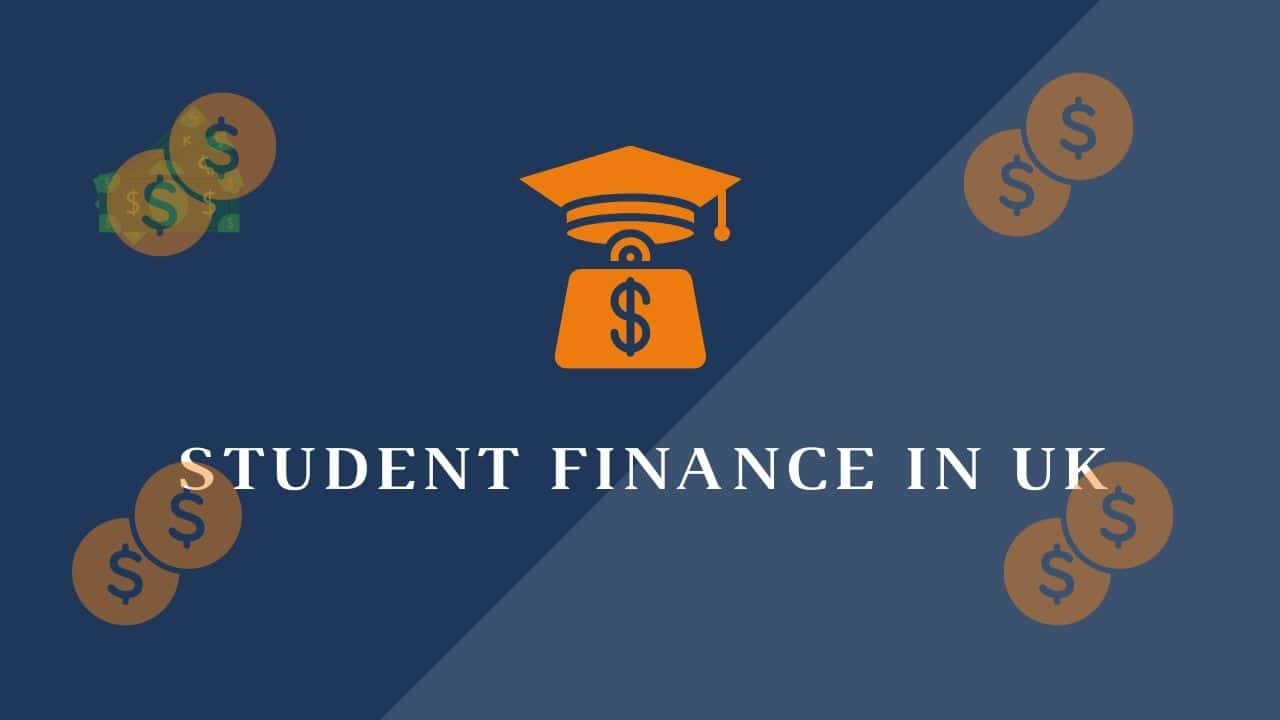If you’re wondering how you’ll fund your degree, there’s no need to worry. As there are plenty of student finance/ loan options in the UK that can cover your cost of tuition and living costs.
Whether it’s an undergraduate degree, foundation degree, Certificate of Higher Education (CertHE), Diploma of Higher Education (DipHE), Higher National Certificate (HNC), Higher National Diploma (HND), or Initial Teacher Training (ITT) course, there are student finance options to help with these costs.
Even if you are a part-time student, so long as you’re offering at least 25% of the equivalent full-time course across an academic year, you may be eligible for a student loan.
This makes it your lucky day as this article will explain all you need to know about student finance, loan, grants, and how to apply for it regardless of which part of the UK you are in.
So, without further ado, Let’s get started with the basics!
What is Student Finance?
Student finance is a broad term used to describe a situation where a student is assisted financially by the government to further his or her post-secondary education also known as college.
Also known as a student loan or grant, It comes in different types – Tuition fee loans and maintenance loans. And the fact that the interest rate is lower than other normal and the repayment schedule is deferred while the student is still in school, really explains it as “student” finance.
As an undergraduate or postgraduate student, you can apply for tuition fees and maintenance loans which include housing fees, living costs, and course fees. However, it all depends on where you study and if you’re eligible.
What Is Student Finance In The UK?
Student finance differs from each country by its laws regarding negotiation and bankruptcy.
According to Wikipedia, Student loans in the UK are collected by Her Majesty’s Revenue and Customs (HRMC) through the tax system and are calculated based on the borrower’s level of income. For example, if the borrower’s income is below a certain level (£15,000 per tax year for 2011/2012, £21,000 per tax year for 2012/2013), no repayments are required, though interest continues to accumulate.
In addition, the student loans are canceled if the borrower dies or becomes permanently unable to work to pay back his or her loan. And depending on which part of UK the borrower is from, the loan can also be canceled if the borrower reaches a certain age or the loan gets up to 30 years.
Who Can Get Student Finance?
You may be eligible for Student finance depending on the following:
- University or college
- Your course of study
- Age
- Your nationality or residency status
- If you’ve studied higher education course before.
#1.Your University or College
For you to be eligible for a student grant, you have to enroll in a university, college, or institution that offers a qualifying course as approved by the Government of UK.
These schools are divided into two – Recognised bodies and Listed Bodies. Recognized bodies are higher institutions of learning (university or college) that can award degrees. While Listed bodies are those that cannot award degrees. If you study a degree course at any listed body, your degree will be awarded by a recognized body.
The reason is that if your degree is not from an officially recognized UK university or college, there’s no guarantee that it’ll count when you’re looking for a job.
So, ensure your university or college is officially recognized, as that is the first step to becoming eligible for student finance. You can check with the office for students at providerverification@officeforstudents.org.uk to know if your university or college is recognized.
#2. Your Course of Study
If your university or college is officially recognized, the next step is to check if your course of study is officially recognized too.
If you’re studying a full-time course, you may be eligible for student finance if it is in the UK and one of the following:
- An integrated Master’s degree
- A first degree, e.g. BA, BSc or BEd
- A Certificate of Higher Education
- An Initial Teacher Training course
- A Diploma of Higher Education (DipHE)
- A Higher National Certificate (HNC)
- Higher National Diploma (HND)
- A pre-registration postgraduate healthcare course
- A Foundation Degree
Assuming you’re studying a part-time course, your course needs an intensity of 25% or more for you to be eligible for student finances.
You’ll be eligible for a Tuition fee if your course is in the UK and any of the following:
- An integrated Master’s degree
- A first degree, e.g. BA, BSc or BEd
- A Certificate of Higher Education
- An Initial Teacher Training course
- A Diploma of Higher Education (DipHE)
- A Higher National Certificate (HNC)
- Higher National Diploma (HND)
- A Foundation Degree
You’ll be eligible for a Maintenance Loan if your course is any of the following:
- An integrated Master’s degree
- A first degree, e.g. BA, BSc or BEd
- An Initial Teacher Training course (If it’s degree level or above)
- A Diploma of Higher Education (DipHE) in dental hygiene and dental therapy or operating department practice.
- A Foundation Degree in dental hygiene and dental therapy.
#3. Age
There’s no specific upper age limit for Student Finance or Tuition Fee Loans or grants. However, you may get limited funding for Maintenance Loans if all the following apply:
- You’re 60 years or over on the first day of the first academic year of your course
- You’re 60 years studying full-time
- Your course started on or after 1 August 2016 and you’re 60.
Additionally, the amount you can apply for depends on your household income.
#4. Your Nationality or Residency status
If you’re a UK national, you’re eligible for student finance if the following apply:
- You’re a UK national or have “settled status” (This means that you have no restrictions on how long you can stay)
- You originally live in England
- You’ve been living in the UK, The Channel Islands or the Isle of Man for 3 continuous years before the first day of your course, apart from temporary absences such as vacations.
For Non-UK nationals, you may be eligible if your residency status is one o the following
- You must have settled status on the first day of the first academic year of the course – which could be 1 September, 1 January, 1 April, or 1 July.
- Refugee (including family members)
- Child of a Swiss national
- Child of a Turkish worker
- A stateless person
- A migrant worker from the EU, Switzerland, Norway, Iceland or Liechtenstein (including family members)
More information about nationality and residency status can be seen on the Gov.UK website.
#5 If You Have Previously Studied
Usually, you’ll get just one student finance if you’re doing your first higher education qualification even if your previous was self-funded. And you may still be eligible for limited funding in certain circumstances and for some courses.
If you stopped your course within the first year, you’ll get funding for the same course or a new course when you go back.
You may also get funding if you:
- suspended your course or withdrew before it finished – and you’re going back to study any course
- are repeating a year of your course at the same university, college, or institution.
You can find more information about student loans if you’ve studied higher education before on the Gov.UK website.
Before Applying For Student Finance In the UK
Before you apply for student finance or loan or grant in the UK, you have to do a thorough check and be sure it’s something you need and you have a plan on how to pay back.
Here are some questions you can ask yourself to come up with a solid decision.
- How much does a university or college cost?
- What is the universal credit if you’re a student?
- Am I eligible as an English student?
- What is the process for Scottish, Wales, and Northern Ireland Students?
Let’s look at the context of each of these questions.
#1. How much does a university or college cost?
Public-funded universities and colleges in England have a tuition fee of £9,250 for the 2020/21 academic year. This applies to undergraduate students taking full-time courses at the university and universities that are recognized by the office for students.
On the other hand, students undergoing full-time undergraduate accelerated courses can have up to £11,100 as tuition fees.
If you live in Northern Ireland, Scotland and Wales, you have different maximum fee limits, and in most cases, your nation’s student finance agency may cover some or all of your tuition.
For Scottish students, the tuition fees for full-time undergraduate courses at publicly-funded Scottish Higher education Institutions as set by the Scottish Government is at £1,820.
Find out more on the Student Awards Agency Scotland (SAAS) Website
If you live in Wales and are studying at a Regulated University in Wales, the maximum tuition fee you can be charged is £9,000.
Find out more on the Student Finance Wales Website.
While if you live in Northern Ireland studying a full-time course at a publicly funded university in Northern Ireland, the maximum tuition you can be charged is £4,395.
Find out more on the Student Finance NI Website.
So, if you belong to any of the categories above, you can apply for a tuition fee loan to cover your undergraduate tuition fee at an approved publicly-funded university where you reside.
#2. What is the universal credit if you’re a student?
Universal credit is an advance payment of the student loan you requested for. And most times, scammers use this to cheat you off your money with a claim that it is free money from the government.
So ensure you contact your student finance agency yourself and be sure of how the processes are going.
#3. Am I eligible as an English student?
There are two types of student loans available to students studying in England – Living costs and Maintenance costs.
Find out what makes you eligible as an English student on the Gov.UK website.
#4. What is the process for Scottish, Wales, and Northern Ireland Students?
The process for student loan application is entirely different for students from Scotland, Wales, and Northern Ireland.
For students in Scotland, the student can apply for tuition fee and maintenance cost to the Student Awards Agency Scotland (SAAS).
While those in Wales and Northern Ireland can apply to Student Finance Wales, and Northern Ireland respectively.
How to Apply For Student Finance/Loan/Grants
How you apply depends on your eligibility for student finance in UK. Since there are different modes of application for the different students, we’ll explain them individually.
#1. For New Students From England
As a full-time or part-time student, you can apply online to Student Finance England. Below are the processes to apply for student finance in England, the UK
- Set up a student finance online account
- Log in and complete the online application
- Include your household income if requested. Your parent or partner will be asked to confirm the details.
- Send in proof of identity if needed.
For further information, visit the Gov.UK website.
#2. For students from Scotland
To apply for student loan as a Scottish student, you can apply online at the SAAS website.
Below are the processes to apply for student finance in Scotland.
- Set up a SAAS account
- Log in and complete the online application to get your SAAS reference number
- Include your household income if requested. Your parent or partner will have to confirm the details.
- Also, include your National Insurance number
For further information, visit the SAAS website.
#3. For students from Northern Ireland
To apply for student loan as a student from Northern Ireland, you can apply online at the Student finance Northern Ireland website.
Below are the processes to apply for student finance in Northern Ireland online..
- Set up a student finance account, but undergraduate EU students need to download a form to apply.
- Log in and complete the online application by answering any questions you’re asked. The questions include; personal details, course information, previous study, National insurance and bank or building society details, and lots more.
- Include your household income if requested. Your parent or partner will be asked to confirm the details.
- Also, send proof of identity.
Visit the student finance Northern Ireland website to get further information.
How Much Is a Student Loan per Month?
Based on previously documented average payments and median average salaries among college graduates, the average monthly student loan payment is anticipated to be $460. The typical borrower repays student loan debt over a 20-year period.
What the Biggest Student Loan You Can Get?
Dependent undergraduate students may borrow between $5,500 and $7,500 in federal student loans each year they are enrolled, with a $31,000 maximum total. Up to $23,000 of your total borrowing may be in subsidized loans if your family is eligible.
Is Fundi a Student Loan?
Student loans are offered in South Africa by the respected organization Fundi, which strives to make them easily accessible and reasonably priced.
Where a Student Can Get a Loan?
Student loans have been made available by banks like Capitec as an alternative to receiving tertiary funding from a financial aid provider like the National Student Financial Aid Scheme (NSFAS), for instance. With their own credit-for-education option, Capitec bank has played a significant role in this endeavor.
What Is the 2022 2023 Student Loan Rate?
For the academic year 2022–2023, the federal student loan interest rates have increased as follows: Undergraduate Direct Subsidized Loans: 4.9 percent Unsubsidized Direct Loans for Undergraduates: 4.9 percent 6.54% of graduate and professional students’ direct unsubsidized loans are available.
How Much Student Debt Is Too Much?
One guideline to follow is to aim to keep your overall student loan debt to a modest portion of your anticipated annual wage from your first job out of college.
How Do Students Get Private Loans?
seeking private student loans Direct loan applications for private college loans are available on each lender’s website. So that you won’t have to submit different student loan applications for schools you’re thinking about, you should apply once you’ve decided which school to attend and once you know how much you need to borrow.
Can I Get a Personal Loan as a Student?
If you’re wondering if students can acquire personal loans, the answer is yes. You can make a personal loan application and utilize the money to pay for your education.
In Summary
There’s no need to give up on your dreams if you can’t fund your education. You can apply for student finance/ loan in the UK and if you’re eligible, you can go ahead and study.
Pay back after school when you’re most likely working your dream job.
Let me know your experience with student finances in the comment box below. While I hope this helps you!
Good luck!
For more information, visit these websites according to your category.
- For English students – Gov.UK
- For students in Scotland – SAAS Website
- Students in Northern Ireland – Student Finance NI
- For students in Wales – Student Finance Wales
FAQs
Is student finance a loan or Grant?
Student Finance in 30 seconds
Student Finance (funded by the government) allows students from any financial background to go to university. The Student Finance package includes a loan for course fees, plus a means-tested Maintenance Loan or Grant to cover living costs.
What are the 4 types of student loans?
There are four main types of loans available to undergraduate students: Subsidized, Unsubsidized, Parent PLUS, and Private.
What happens if you don't pay off student loans?
Let your lender know if you may have problems repaying your student loan. Failing to pay your student loan within 90 days classifies the debt as delinquent, which means your credit rating will take a hit. After 270 days, the student loan is in default and may then be transferred to a collection agency to recover.
{
“@context”: “https://schema.org”,
“@type”: “FAQPage”,
“mainEntity”: [
{
“@type”: “Question”,
“name”: “Is student finance a loan or Grant?”,
“acceptedAnswer”: {
“@type”: “Answer”,
“text”: “
Student Finance in 30 seconds
Student Finance (funded by the government) allows students from any financial background to go to university. The Student Finance package includes a loan for course fees, plus a means-tested Maintenance Loan or Grant to cover living costs.
“
}
}
, {
“@type”: “Question”,
“name”: “What are the 4 types of student loans?”,
“acceptedAnswer”: {
“@type”: “Answer”,
“text”: “
There are four main types of loans available to undergraduate students: Subsidized, Unsubsidized, Parent PLUS, and Private.
“
}
}
, {
“@type”: “Question”,
“name”: “What happens if you don’t pay off student loans?”,
“acceptedAnswer”: {
“@type”: “Answer”,
“text”: “
Let your lender know if you may have problems repaying your student loan. Failing to pay your student loan within 90 days classifies the debt as delinquent, which means your credit rating will take a hit. After 270 days, the student loan is in default and may then be transferred to a collection agency to recover.
“
}
}
]
}
- Sources of finance: A foolproof list for small businesses and entrepreneurs
- Accounting and finance: Difference, jobs, courses, careers (+ top university picks)
- PRINCIPLES OF FINANCE
- Financial Intelligence: Babysteps to Proper Mastery (+ How to guide & Detailed courses)
- PROJECT FINANCE: Simple Guide to Kick start any Project(+ best picks)
- MOST EXPENSIVE COLLEGES IN THE WORLD: Top 15+ Most Expensive Colleges in 2022






